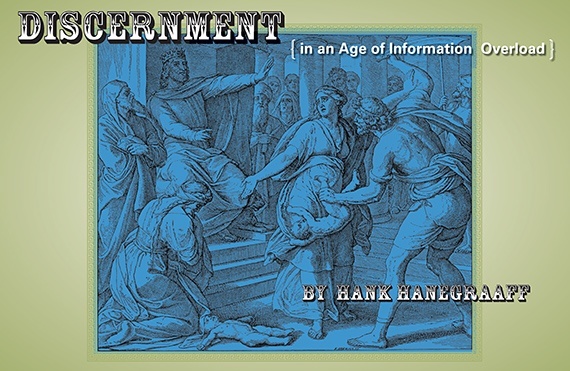This article first appeared in CHRISTIAN RESEARCH JOURNAL, volume 33, number 03 (2010). For further information or to subscribe to the Christian Research Journal go to: http://www.equip.org
SYNOPSIS
In our age of information overload, Christians must learn to discern between good and evil, right and wrong, truth and falsity. The need for discernment becomes particularly pressing in the face of sharp disagreement on critical issues among leading Christian apologists. A case in point concerns debate over the CHRISTIAN RESEARCH JOURNAL‘s recent publication of CRI’s in-depth reevaluation of the “Local Church” Movement of Watchman Nee and Witness Lee (vol. 32/no. 6). Using the acronym D-I-S-C-E-R-N, I sort out the matter at hand and codify principles formatted as a memorable tool through which believers can, in general, separate wheat and chaff for themselves.
“The proverbs of Solomon the son of David, king of Israel:
To know wisdom and instruction,
To discern the sayings of understanding,
To receive instruction in wise behavior,
Righteousness, justice and equity;
To give prudence to the naive,
To the youth knowledge and discretion.”
-Proverbs 1:1-4 NASB
For me, the words discern and Solomon are virtually synonymous. Whenever I hear the word discern (or discernment), Solomon immediately flashes through my mind. The Creator of heaven and earth gave Solomon the opportunity to ask for whatever he wished. Solomon’s response is forever imprinted on the canvas of my consciousness. He did not ask for wealth or honor. Instead, he asked for the ability to discern between good and evil. So pleased was the Sovereign with Solomon’s choice that He granted him a wise and discerning heart-and He granted him riches and honor as well.1
Like Solomon, we would do well to discern between good and evil, right and wrong, truth and falsity. Indeed, we should so steep ourselves in his Proverbs that we, like he, may be able “to discern the sayings of understanding” (Prov. 1:2 NASB, emphasis added). Likewise, with Paul, we must pray that our “love may abound more and more in knowledge and depth of insight,” so that we “may be able to discern what is best and may be pure and blameless until the day of Christ” (Phil. 1:9-10, emphasis added).2
Without the ability to discern, we stand impotent in an age of information overload. A glance back to 1999 may be instructive. Formidable intellects across the Christian landscape were busily propagating reckless rumors, spurious statistics, and anecdotal arguments respecting a bug that portended the demise of Western civilization. Although painful, the January 1999 issue of Esquire gave us a glimpse of the world’s perspective on the lack of discernment among Christians. Leaders were castigated for “mining the subjunctive, cultivating the seed of the threat buried inside each unrealized instance.”3 Not knowing how to discern between wheat and chaff, heat and light, followers were resigned to stalking up on freeze-dried food and generators. What was really in short supply, of course, was the ability to discern. As evidenced by my article in a 1999 edition of the CHRISTIAN RESEARCH JOURNAL, a modicum of discernment would have been sufficient to debug the millennium bug.4
Today we face another situation requiring the ability to discern. In January we published a special edition of the CHRISTIAN RESEARCH JOURNAL featuring the culmination of a six-year primary research project respecting a movement originally founded by a Chinese Christian named Watchman Nee.5 Primary research was conducted not only in the U.S. but in such far-away places as China, Taiwan, South Korea, and England. It involved careful evaluation of literally hundreds of books, papers, church documents, and audio and video recordings. Even court documents. The result of our primary research is encapsulated in three words splashed across the front cover of our flagship magazine: “We Were Wrong.”
Shortly after publication, Norman Geisler and Ron Rhodes issued a response expressing surprise at our conclusions: “Not only does CRI no longer believe the [‘Local Church’ Movement (LC)] is a cult, as they once did, but they do not even believe they are an ‘aberrant Christian group’ (47). They now call the LC ‘a solidly orthodox group of believers’ (47, emphasis added). Moreover, they say, members of the LC are in many ways ‘an exemplary group of Christians’ (29). All this has come as a great surprise to the majority of countercult ministries and apologists who have studied the matter and have come to the opposite conclusion.”6
For concerned Christians, this poses a significant dilemma. Are the primary research findings of the Christian Research Institute correct? Or are seventy-plus evangelical scholars from seven nations who “call on ‘local churches’ to renounce doctrines, legal attacks” on target?7 My purpose here is not merely to sort out the matter at hand, but to provide a memorable discernment tool through which you can separate wheat and chaff throughout the remainder of your Christian walk. As we think through this issue, bear in mind that we are not engaged in a mere ivory tower debate. Ideas have consequences. To unjustly label a brother or sister a cultist, or worse, may well lead to public humiliation and disgrace in the West-in the East it can lead to prison and death.
DOUBLE STANDARD
To discern between right and wrong, we must ever be wary of applying a “double standard.”8 In the present matter, the “local churches” (LC) are reproached for making unorthodox statements with respect to deification. As such, seventy-plus scholars from seven nations have called on the LC “to disavow and cease to publish”9 the following declaration: “We the believers are begotten of God. What is begotten of man is man, and what is begotten of God must be God. We are born of God; hence, in this sense, we are God.”10
What is neglected is the following qualifying sentence: “Nevertheless, we must know that we do not share God’s Person and cannot be worshiped by others. Only God Himself has the Person of God and can be worshiped by man.”11 Not only so, but as the author makes clear elsewhere, “It is a great heresy to say that we are made like God in His Godhead.”12 Or, as he writes, “From eternity to eternity He [God] remains the same in His essence. But in His economy the Triune God has changed in the sense of being processed.”13 As such, believers are infused with the life of God-and thus deified-through a “process involving regeneration, sanctification, renewing, transformation, conformation, and glorification.”14
Apart from a double standard, Athanasius of Alexandria (d. 373), widely regarded as the greatest theologian of his time, would likewise be accused of heresy for suggesting that “[the Word] was made man that we might be made God.”15 Not only so, but the apostle Peter would be suspect for stating that we are “partakers of the divine nature” (2 Pet. 1:4 NASB). Of course, in context, Peter is not suggesting that mere humans may be deified as gods, but he is speaking of believers undergoing a moral transformation from one that expresses the corruption of the world to one that reflects the character of God.
INNOCENT UNTIL PROVEN GUILTY
In initially viewing the list of people who allegedly signed the “Open Letter,”16 I was surprised-dare I say, shocked-at some of the names I encountered. My initial reaction was hardly in keeping with the maxim, Innocent until proven guilty. The first two scholars I called told me they were not aware of the Open Letter, did not endorse its conclusions, and never knowingly lent their names to it.17
Furthermore, when leaders in the LC testified to their belief in one God, revealed in three Persons who are eternally distinct; to the reality that human beings can never ontologically attain Godhood; and to the fact that they are “only the church” as opposed to being “the only church,” Christian charity alone compelled me to give them the benefit of the doubt. After a six-year primary research process, I am fully persuaded that the LC is innocent-rather than guilty-of compromising essential Christian doctrine. Moreover, it has become apparent that the Holy Spirit has moved in their midst to recover New Testament principles and practices widely neglected in the modern church.
Finally, what is true from a theological perspective is true sociologically as well. After meeting thousands of LC adherents and personally interacting with hundreds, I am not only convinced that they are innocent of the charge of cultism from a sociological perspective, but I can testify that they are among the finest Christians I have encountered in life and ministry. Even respecting litigation, every evidence points to the reality that the LC first tried diligently to reconcile libelous claims through peaceful fellowship as the Bible instructs in Matthew 18 and 2 Timothy 2. In three extreme cases in which the LC was accused of criminal behavior, the LC pursued requisite vindication through secular courts because Christian authors and publishers outright rejected their efforts to attain a Christ-honoring rapprochement.
SOPHISTRY
Sophistry might best be defined as subtly deceptive reasoning or argumentation. At first blush the argument appears airtight, but on closer examination its flaws are exposed. An apt illustration was a video series by Chuck Missler and John Ankerberg titled, Will America Survive the Y2K Crisis?18 The series presented elaborate arguments designed to demonstrate just how vulnerable embedded chips made our banking system during the alleged Y2K crisis. Unless one is aware of the facts, the subtly deceptive reasoning appears to have real substance. The video, for example, contends that because January 1, 2000, was a Saturday, bank vaults would snap open making their contents accessible to crooks and making them inaccessible the following Monday to customers. This sophistry sounds persuasive until one realizes that the opening and closing of bank vaults is not regulated by embedded chips to begin with. Rather they are regulated by triply redundant, hand-wound mechanical timers set each evening by bank personnel. What was truly regrettable is that credible Christian leaders were soon parroting information garnered from the series.19
Sophistry with respect to the matter at hand is likewise troubling. Indeed, the Open Letter in question is a veritable case study in sophistry. Consider, for example, the matter of lawsuits. The LC is painted as a victimizer, despite the fact that Harvest House published a book by John Ankerberg and John Weldon that identifies the LC as a cult and defines a cult in terms of immoral and criminal behaviors, including murder, rape, prostitution, and child molestation.20 As Elliot Miller commented, convincing a worldly court to hold Christians to a lower standard than it holds the world is hardly a cause for celebration.21
Furthermore, Harvest House, not the LC, initiated litigation. Harvest House has in fact engaged in more litigation against Christians than has the LC.22 Although the LC engaged in two other suits, they did so only after exhausting all other options. In both cases, the court concluded that distortions were deliberate and intentional. Not only was Witness Lee identified as the leader of a cult, but false statements conveyed that the LC engaged in deceptive recruiting practices in order to bring the weak and vulnerable into total subjugation.
Finally, as eminent social scientist Dr. Rodney Stark testified in court, charges of sexual and financial hanky-panky and quoting Lee’s theological statements so as to be diametrically opposed to what he was saying are not only libelous, but patently unfair.23
CONTEXT
As frequently noted in Christian circles, a text without a context is a pretext. The same principle applies to broad-ranging matters of discernment. It particularly applies to present considerations. J. Gordon Melton, founder of the Institute for the Study of American Religions, testified that his examination of the research used by the Spiritual Counterfeits Project in their book on the LC (The God-Men) was among the more painful experiences of his Christian life. Not because he found the LC to be a cult, but because as he began to check quotes used against the LC he discovered time and time again that they were placed “in a foreign context” and made “to say just the opposite” of what was intended. Says Melton, “This was done while ignoring the plain teachings and affirmations concerning the great truths of the Christian faith found throughout Lee’s writings.”24 Furthermore, although the Open Letter seeks to impugn Witness Lee and the LC with the heresy of modalism, the facts clearly point in another direction. Indeed, Lee clearly emphasized that the Father, Son, and Holy Spirit are three distinct centers of consciousness and volition, or three I’s eternally united in subject/object relationships. In commenting on John 10:30 (“I and the Father are one”) he wrote, “Although the Father and the Son are one, between them there is still a distinction of I and the Father. We must not disregard this point, because if we do we would become modalists.“25 Finally, if Lee is read in context, it is readily apparent that he makes a distinction between the essential and economic Trinity. As such, he stressed that from an outward objective aspect, Christ and the Spirit are two. However, from an inward subjective aspect, Christ and Spirit are one. Put another way, the Persons are never identical, but their manifest presence from a personal experiential perspective in the life of the believer is indistinguishable. Whether one agrees or disagrees, this is hardly a matter of heresy.
EQUIVOCATION
As I frequently communicate on the Bible Answer Man broadcast, words are not univocal, they are equivocal. Thus, their meanings are determined in large part by the context in which they are used. When I say that I hold to one God, revealed in three Persons, eternally distinct, I am clearly equivocating on the word Person. As such, I do not use Person in the sense of common parlance, but rather in the sense of “identity formed and completed on the basis of relationships” within the Godhead. To discern what someone means by what they say, we must carefully consider the principle of equivocation.26 As a case in point, the LC is often unjustly criticized for their practice of prophesying. This despite the fact that they do not prophesy in the sense of foretelling the future but rather in the 1 Corinthians 14 sense of forthtelling-of strengthening the faithful through encouragement, exhortation, edification, and equipping. The LC, likewise, equivocates on words such as “Christendom” and Babylon.” Properly understood, such words are not used to castigate Christians within denominations but rather denominationalism itself. As Lee makes abundantly clear in his writings, regardless of denominational background, if “we believe in Jesus Christ as the Son of God, who was incarnated as a man, died on the cross for our sins, and resurrected from the dead, we are all redeemed, justified, regenerated and saved. And we all have the divine life within us. Therefore, we are all of one Body.”27 Lest we become self-righteous in regard to some of the harsher equivocations used by Lee, we would do well to humbly remember our own sins. Many within evangelicalism have dubbed denominations who believe that God has only always had one congruent covenant community connected by the cross as replacement theologians guilty of spreading the message of anti-Semitism. In their own replacement ideology (to coin another equivocation), God has two people and one of those people (Israel) will replace the other (church) as the focus of God’s plans during the Tribulation. Despite the harshness of the rhetoric between these groups, they are yet of one body through faith in our resurrected redeemer.28
RESEARCH
As J. Gordon Melton discovered with respect to the LC, to rightly discern between heat and light requires first-rate primary research. In working on his Encyclopedia of American Religions, he took note of “the ludicrous attempt to equate the Local Church’s practice of pray-reading with the use of mantras in Eastern religions.” As his research rightly revealed, “They bear no resemblance whatsoever.”29 As I have personally discerned, Melton is right. While countercult authorities attempted to convince me that the LC used pray-reading to work devotees into an altered state of consciousness, primary research revealed precisely the opposite. Not only is pray-reading a means by which LC members memorize Scripture, it is also a meaningful link between their intake of Scripture and effective prayer. I fear that lack of primary research is at the root of much of the misinformation that continues to be communicated in evangelical circles. Shortly after publication of the CHRISTIAN RESEARCH JOURNAL featuring the culmination of our six-year primary research project, Geisler and Rhodes issued the aforementioned response expressing surprise at our conclusions: “All of this has come as a great surprise to the majority of countercult ministries and apologists who have studied the matter and have come to the opposite conclusion.” Question is: Have they really studied the matter? Or has rhetoric replaced research?30 Had Spiritual Counterfeits Project (SCP) genuinely applied proper research principles to their God-Men project, they would not have based the substance of their libelous charges on the unconfirmed account of a single hostile ex-member.31 As Melton rightly observed,
I was genuinely shaken as my research proceeded. I was concerned that such a parody on the life of a group of fellow Christians had been written, that it had been sponsored by such an organization as SCP, and then published by such a reputable publisher as InterVarsity Press. I was more shaken, however, by the obvious implications of the ethics involved in the production of such a book. The mistakes and misrepresentations in the book are so frequent and so consistent that it strains credulity to suggest that The God-Men is merely the product of poor scholarship.32
My research into present accusations by the countercult community has left me similarly troubled and shaken. Perhaps it is the countercult community who need reformation.
NITPICKING
Last but not least is the matter of nitpicking. Jesus’ warnings in this regard are as instructive as they are sobering. Speaking to the Pharisees, He said, “You blind guides! You strain out a gnat but swallow a camel” (Matt. 23:24). While our Lord counseled followers to make judgments based on right standards (John 7:24), He cautioned followers not to judge hypocritically (Matt. 7:1-5). Unnecessary and unjustified fault-finding does not undergird the kingdom of God-it ultimately undermines it. We all make mistakes. In his Systematic Theology, Geisler wrongly brands Dr. Kenneth Gentry a full preterist while rightly branding full preterism a heresy.33 In truth, Dr. Gentry is anything but a heretic. Indeed, like me, he has spent a good portion of his life and ministry debunking full preterism. While the cost to Dr. Gentry is not insignificant, it would be less than charitable to dismiss Geisler’s prodigious volume on the basis of such imprecisions. In their response to the JOURNAL’S reassessment of the LC, Geisler and Rhodes imprecisely communicate that the Son proceeds from the Father.34 At the risk of getting stuck in a psycho-epistemological cocoon or linguistic hall of mirrors, I much prefer classical creedal verbiage. The Son does not proceed, but is begotten of the Father; it is the Spirit who proceeds from the Father. As Dr. Robert Letham explains, “The Father is not begotten nor does he proceed; the Son does not beget, nor does he proceed; the Spirit neither begets nor spirates.”35 Geisler and Rhodes, likewise, seem confused with respect to CRI’s former position regarding the LC. At the beginning of their article they incorrectly assert that CRI once held that the LC was a cult; at a later stage they correctly note that CRI did not label the LC a cult.36 Whatever they really believe in this regard is largely irrelevant. To waste precious time and effort nitpicking such matters is in the words of Solomon, “Meaningless! Meaningless!…Utterly meaningless!” (Eccl. 1:2). What is meaningful is this: through game-changing primary research, we have discerned that We Were Wrong! Uttering those three words is never easy. From a personal and ministry standpoint, the cost has been enormous. In the end, however, the goal is not to be politically correct or to gain a larger platform; the goal is to hear our Savior say, “Well done, good and faithful servant!” (Matt. 25:21). We live in an age in which Internet fabrications “travel half-way around the world before truth has had a chance to put its boots on.” Thus Paul’s words ring through the centuries with added urgency: “Stand firm then, with the belt of truth buckled around your waist” (Eph. 6:14). Without the ability to discern between truth and falsity, the covering that protects us from the Devil’s schemes simply crumbles to the ground, leaving us naked and vulnerable.
Hank Hanegraaff is president of the Christian Research Institute and host of the Bible Answer Man broadcast heard daily throughout the United States and Canada. For a list of stations airing the Bible Answer Man, or to listen online, log on to Equip.org.
NOTES
1 See 1 Kings 3.
2 Unless noted otherwise, all Scripture quotations are from the New International Version.
3 Tom Junod, “365 Days to the Apocalypse and We Still Don’t Know Where to Hide the Jews…and Other Notes from Pat Robertson’s Y2K Conference,” Esquire, January 1999, 96.
4 See Hank Hanegraaff, “The Millennium Bug Debugged,” Christian Research Journal 22, 1 (1999): 12-21.
5 See Christian Research Journal 32, 6 (2009).
6 Norm Geisler and Ron Rhodes, “A Response to the Christian Research Journal’s Recent Defense of the ‘Local Church’ Movement,” http://www.normangeisler.net/response-tochristian-research-journal-recent-defense-local-church-movement.html, emphasis in Geisler and Rhodes.
7 “Leading Evangelical Scholars Call on ‘Local Churches’ to Renounce Doctrines, Legal Attacks,” press release, January 9, 2007, http://www.open-letter.org/pdf/OL_PressRelease.pdf.
8 A point of clarification: the letters that constitute the acronym D-I-S-C-E-R-N represent carefully selected words that identify concepts important to remembering how to discern between wheat and chaff, heat and light. Some words employed in the acronym explicitly identify discernment principles, such as Innocent until proven guilty, Context, and Research. Other words identify common errors, such as Double standard and Nitpicking.
9 “An Open Letter to the Leadership of Living Stream Ministry and the ‘Local Churches,'” http://www.open-letter.org.
10 Witness Lee, A Deeper Study of the Divine Dispensing (Anaheim: Living Stream Ministry, 1990), 53.
11 Ibid.
12 Witness Lee, The Christian Life (Anaheim: Living Stream Ministry, 1994), 134.
13 Witness Lee, The Conclusion of the New Testament, Messages 79-98 (Anaheim: Living Stream Ministry, 1997), 914. See also Lee, Divine Dispensing, 50; Witness Lee, The Spirit and the Body (Anaheim: Living Stream Ministry, 1976), 83-84.
14 The Editors, “The Crystallization: Union with the Triune God,” Affirmation and Critique 1, 3 (July 1996): 64.
15 de Incarnatione, 54.3.
16 See “An Open Letter to the Leadership of Living Stream Ministry and the ‘Local Churches.”
17 Given our research thus far, there is reason to suspect that the list of signatories has been inflated.
18 Chuck Missler and John Ankerberg, Will America Survive the Y2K Crisis? (Coeur d’Alene, ID: Koinonia House, 1998), video.
19 See Hank Hanegraaff, The Millennium Bug Debugged (Minneapolis: Bethany House, 1999).
20 See Elliot Miller, “Cultic, Aberrant, or (Unconventionally) Orthodox? A Reassessment of the ‘Local Church’ Movement, Part 5,” Christian Research Journal 32, 6 (2010): 42-44.
21 See ibid., 44.
22 See ibid., 46.
23 See ibid., 41.
24 J. Gordon Melton, An Open Letter concerning the Local Church, Witness Lee and The God-Men Controversy (Santa Barbara, CA: The Institute for the Study of American Religion, 1985), http://www.contendingforthefaith.com/libel-litigations/god-men/OpenLtr/open.html. Scholars at Fuller Theological Seminary came to similar conclusions as a result of their own independent and extensive study. In a summary of their findings they stated, “The teachings of Witness Lee have been grossly misrepresented and therefore most frequently misunderstood in the general Christian community, especially among those who classify themselves as evangelicals.” (“Statement from Fuller Theological Seminary,” January 5, 2006, http://lctestimony.org/FullerStatement.pdf.)
25 Witness Lee, The Conclusion of the New Testament, Messages 1-20 (Anaheim: Living Stream Ministry, 1997), 34, emphasis in original.
26 Although the word Equivocation (the E in D-I-S-C-E-R-N) often connotes an informal logical fallacy (within the category of fallacies of ambiguity), I’m employing the word’s denotative definition, namely, that nearly all words are vulnerable to more than one interpretation; and as such, context must be taken into account in order to properly discern an author’s intention (note that equivocation can itself be used in an equivocal manner).
27 Witness Lee, The Practical Expression of the Church (Anaheim: Living Stream Ministry, 1970), 98.
28 See Hank Hanegraaff, The Apocalypse Code: Find Out What the Bible Really Says about the End Times…and Why It Matters Today (Nashville: Thomas Nelson, 2007).
29 Melton, An Open Letter concerning the Local Church.
30 It should be noted that Norman Geisler and Ron Rhodes continue to bear significant fruit in the vineyard of apologetics. I particularly appreciated Ron’s recent article on hermeneutics, “Recognizing and Interpreting Anthropomorphic Language” (Christian Research Journal 33, 2 [2010]: 6-7).
31 Melton, An Open Letter concerning the Local Church.
32 Ibid.
33 Norman Geisler, Systematic Theology: Volume Four: Church, Last Things (Minneapolis: Bethany House, 2005), 635.
34 Geisler and Rhodes write, “the Father did not die for our sins, nor does the Father eternally proceed from the Father, as the Son does from the Father.” (“A Response to the Christian Research Journal.”)
35 Robert Letham, The Holy Trinity: In Scripture, History, Theology, and Worship (Phillipsburg, NJ: P&R, 2004), 180.
36 On a more serious note, Geisler and Rhodes wrongly accuse the LC of litigation on theological grounds. In reality, the LC litigated due to libelous charges of sociological cultism.









